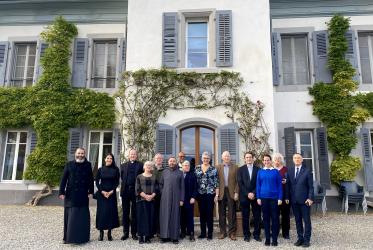Plenary on church unity
Fr. Dr Jacob Kurien is the vice-principal of the Orthodox Theological Seminary (Malankara Orthodox Syrian Church) in Kottayam, Kerala, India
An "invitation" on the ecclesiology statement from an Orthodox, Indian perspective
Moderator, Sisters and Brothers,
There is a proverbial statement in the Harare Report: "Any vision which does not inspire new forms of acting remains a distant utopia". The strength, of the Ecclesiology statement entitled "Called to be the One Church", is an inspiring vision and a new form of acting for the manifestation of Christian unity.
As an Oriental Orthodox, I am delighted to notice a Trinitarian image of unity and an emphasis on the Faith of the early undivided Church as embodied in the Niceno-Constantinopolitan Creed. As an Indian Christian living in a multi-religious and dominantly non-christian background, I see in the text a commitment for inter-religious dialogue as integral to the unity we seek. A theological self-understanding on religious plurality and a common stance against religious extremism and violence are central to our vision of Christian unity.
My reflections and comments on the text are summed up in seven observations especially from an Orthodox, Indian perspective.
Observation 1. An anxiety: over the prevailing culture of stagnation'
Our text begins with an affirmation on "our commitment on the way towards visible unity". But are the Churches, including my own, really serious about this commitment? Are we not living in an age of ecumenical stagnation"? (For this term stagnation' I am indebted to Prof. Nikos Nissiotis, one of the former Moderators of the Faith and Order Commission). No doubt, we have been accustomed to a culture of stagnation, with no spectacular unity-concerns for decades. Let me touch my own context. Despite the theological agreements on almost all theological issues, the two families of the Orthodox Churches still remain divided! Many people, especially youth, have lost hope and confidence in official' deliberations for unity. They have been seeking alternate channels of Christian unity. Out text is infact inviting the Churches to rethink the legitimacy of our self-complacency, we having become immune to ecumenical sensitivity and having delegated the unity-concerns to W.C.C and similar bodies.
Observation 2. A hope : for new ecumenical spaces' at the national and the local levels too.
The second paragraph of the text, is very much underscoring the fact that the Church is manifested "in each place" through the local Eucharistic Koinonia and the Koinonia of such Eucharistic communities is the manifestation of unity which is the ideal conciliarity of the early ecumenical councils. To-day we, however, experience this Koinonia and conciliarity in limited horizons only. Such experiences give us the hope for wider ecumenical spaces'. It is hoped that the recently suggested ecumenical space Viz. the Global Christian Forum can provide new levels of conciliarity in the national and local situations too where the experience of conciliarity was so far limited.
bservation 3. An opportunity: to heal the painful memories of divisive ecclesiastical interventions.
The third paragraph of our text is highlighting the beauty and gift of diversity in Church-life. The Orthodox Churches in general and the Orthodox Church in India particularly, witness to an underlying unity in the midst of cultural diversities. We in India have been experiencing it in two contexts: viz. that of the same Koinonia in diverse cultural traditions and that of the same cultural group in diverse ecclesiastical traditions. We can observe here that it is not the cultural diversity that became divisive, but the ecclesiastical interventions. This calls us for measures of healing the painful memories of divisive ecclesiastical interventions from outside and seek ways of returning to the once enjoyed unity.
Observation 4. A missing note : on "holiness"
The text on ecclesiology has substantial elaboration on Oneness, Apostolicity and Catholicity of the Church (paras 3 to 6). But its comparative silence on "Holiness" is conspicuous. Is this symbolic of the growing signs of unholiness becoming legitimized in the Chuches? Is not this missing' a reminder to rethink the Churches' pre-occupation with money and power-politics.
Observation 5. A threat : of proselytism.
Two paragraphs of the text (Paras 8 and 9) seek to underline our common belonging to Christ through baptism. We should thank, the Faith and Order Commission, the JWG and other study groups for the theological consensus on "Baptism" as a basis for our common belonging to Christ. Our belonging to Christ through Baptism', will be the basic ground for the mutual accountability. However, it remains a fact that wherever proselytism is practised with or without (re) baptism in inter-christian belongingness, the quality of the common belonging is seriously threatened.
Observation 6. A need : for more appropriate criteria in judging social commitment'
Paragraphs 10 and 11 in the text are projecting the mission of the Church as a reconciling and reconciled' community. In my Indian context, the mutual reconciliation of the Churches has to take place largely in the area of mutual apprehensions on each other's social commitment. Social commitment is often judged by such inadequate criteria like the weight given to the Brahminic Hinduism, solidarity with the Dalits and the approach to the ordination of women etc. The apprehensions on the basis of such criteria have branded certain Churches as "Caste"-oriented and affected the local initiatives on Church-unity. Therefore, the already existing social apprehensions have to be sorted out, and more appropriate criteria are to be evolved.
Observation 7. A Challenge : of choices and priorities in the matter of confessional allegiance.
When we finally address the nine (and similar) questions in the unity-text, are we once again driven back to the pre-Uppsala situation of comparative ecclesiology'? The reason for this doubt is that the possible answers may again be confessionally' conditioned. In the Asian context, especially that of mine, the local initiatives and enthusiasm for visible unity have been controlled by the confessional identities created by a so called ecclesiastical neo-colonialism'. Here, the Churches have a challenge indeed to make choices and set priorities in favour of local fruits of visible unity, always bearing in mind the words of the Indian Philosopher-poet, Rabindranath Tagore: "Emancipation from the soil is no freedom for the tree".
God, in Your Grace, transform not only the world, but also the Churches - Amen.
Fr. Dr. Jacob Kurien, Malankara Orthodox Church
Vice-Principal, Orthodox Seminary
Kottayam, Kerala, India
jksem (at) sancharnet.in


